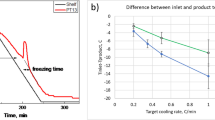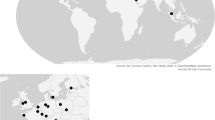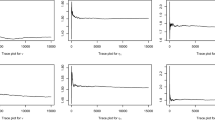Abstract
On the basis of theoretical TG curves it has been shown that the kinetic compensation effect observed in thermal decomposition reactions is not due to the special form of the Arrhenius equation. Formally, the validity of a linear kinetic compensation law implies the existence of a characteristic temperature at which the rate constants of all reactions have the same value, but this temperature can be higher or lower than the temperatures at which the decomposition takes place.
Thermal decomposition processes can be better characterized by means of the compensation parameters than by means of the common kinetic parameters or decomposition temperatures, since the shape and the position of the TG curves and the kinetic parameters derived can be very much influenced by procedural variables, but the compensation parameters are independent of them.
The kinetic compensation effect is completely real, but its formulation in terms of the Arrhenius equation is only formal and does not reveal the physical significance of the compensation parameters.
Résumé
A l'aide de courbes TG théoriques, on montre que le soi-disant effet de compensation cinétique observé lors des réactions de décomposition thermique n'est pas dû à la forme spéciale de l'équation d'Arrhenius et qu'il n'est pas nécessaire que la décomposition thermique ait lieu dans le même intervalle de température pour qu'une loi de compensation cinétique linéaire soit valable. La validité d'une loi de compensation cinétique linéaire implique formellement l'existence d'une température caractéristique à laquelle les constantes de vitesse de toutes les réactions aient la même valeur, mais cette température peut être plus élevée ou plus faible que celle à laquelle la décomposition a lieu.
Les paramètres de compensation permettent de caractériser les processus de décomposition thermique de meilleure faşon que les paramètres cinétiques habituels ou les températures de décomposition. En effet, la forme et la position des courbes TG et les paramètres cinétiques qui sont déduits de celles-ci peuvent être fortement influencés par les variables expérimentales. Au contraire, les paramètres de compensation sont indépendants des variables expérimentales.
L'effet de compensation cinétique est tout à fait réel mais sa description à l'aide de l'équation d'Arrhenius est simplement formelle et ne révèle pas la signification physique des paramètres de compensation.
Zusammenfassung
Am Beispiel theoretischer TG-Kurven wurde gezeigt, daß thermischen Zersetzungsreaktionen beobachtete, sogenannte kinetische Kompensationseffekt nicht der speziellen Form der Arrhenius-Gleichung zuzuschreiben ist und daß die Gültigkeit eines linearen kinetischen Kompensationsgesetzes die thermische Zersetzung in demselben Temperaturbereich nicht voraussetzt. Formal bedeutet die Gültigkeit eines kinetischen Kompensationsgesetzes die Existenz einer charakteristischen Temperatur, bei welcher die Geschwindigkeitskonstanten sämtlicher Reaktionen denselben Wert besitzen, doch kann diese Temperatur höher oder niedriger sein als diejenige, bei welcher die Zersetzung stattfindet.
Thermische Zersetzungsvorgänge können eher durch Kompensationsparameter charakterisiert werden, als durch gemeinsame kinetische Parameter oder Zersetzungstemperaturen, da die Form und Lage der TG-Kurven und der abgeleiteten kinetischen Parameter durch Prozeßvariablen stark beeinflußt werden können. Die Kompensationsparameter sind von diesen unabhängig.
Der kinetische Kompensationseffekt ist vollkommen real, doch ist seine Formulierung nach der Arrhenius-Gleichung bloß formal und enthüllt die physikalische Bedeutung der Kompensationsparameter nicht.
Резюме
Используя теоретиче ские TG кривые, было показано, что, так назы ваемый, кинетический компен сационный эффект, наб людаемый в реакциях термическо го разложения, не обусловлен особой формой уравнения Арр ениуса и что для соблюдения линей ного кинетического компе нсацинного закона не т необходимости прово дить термическое разложение в том же са мом температурном ин тервале. Формально, соблюдени е закон линейной кинетическ ой компенсации, означ ает существование харак теристической темпе ратуры, при которой констант ы скорости всех реакц ий имеют то же самое значение, но эта температура може т быть выше или ниже то й температуры, при кото рой происходит разложение. Процессы термического разлож ения могут быть лучше охарактер изованы компенсационными па раметрами, чем общими кинетическими парам етрами или температу рами разложения, так как ви д и положение кривых TG и производных кинетич еских параметров, могут в значительной степени затрагивать ся процедурными измене ниями, в то время как компенсаци онные параметры неза висимы от них. Кинетический ком пенсационный эффект совершенно ре альный, но формулиров ка его на основе уравнения Арр ениуса является формальной и не раскрывает физич еского смысла компенсацион ных параметров.
Similar content being viewed by others
References
J. M. Thomas andW. J. Thomas, Introduction to the Principles of Heterogeneous Catalysis. Academic Press, New York-London, 1967, p. 263.
M. M. Pavlyuchenko, E. A. Prodan andS. A. Slyshkina, Dokl. Akad. Nauk SSSR, 181 (1968) 1174.
J. Zsakó andM. Lungu, J. Thermal Anal., 5 (1973) 77.
J. Zsakó andH. E. Arz, J. Thermal Anal., 6 (1974) 651.
J. Zsakó, Cs. Várhelyi, G. Liptay andK. Szilágyi, J. Thermal Anal., 7 (1975) 41.
J.Zsakó, E.Kékedy andCs. Várhelyi, Proc. 3. ICTA, Davos 1971 (2), p. 487.
J.Zsakó, Cs. Várhelyi and E.Kékedy, Proc. 4. ICTA, Budapest 1974.
J.Zsakó, Cs. Várhelyi and G.Liptay, Proc. 4. International Conf. on Thermal Analysis., Budapest 1974.
P. D.Garn, J. Thermal Anal. in press.
P. D.Garn, Proc. 4. ICTA, Budapest 1974.
J. Zsakó, J. Thermal Anal., 5 (1973) 239.
J. Zsakó, J. Chim. Phys., 66 (1969) 1041.
J. Zsakó, J. Phys. Chem., 52 (1968) 2406.
Author information
Authors and Affiliations
Rights and permissions
About this article
Cite this article
Zsakó, J. The kinetic compensation effect. Journal of Thermal Analysis 9, 101–108 (1976). https://doi.org/10.1007/BF01909271
Received:
Issue Date:
DOI: https://doi.org/10.1007/BF01909271




